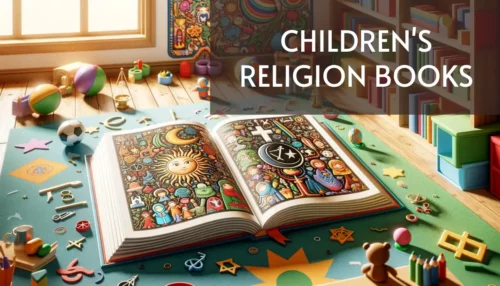Welcome to our corner dedicated to those passionate about spirituality and wisdom. Here you will find a wide selection of religious books available for free download, to enrich your spiritual life.
Our goal is to provide you with access to the teachings and reflections of various beliefs and traditions, all in one place. Discover our extensive library of religious books, covering everything from the most popular traditions to the lesser-known ones.
We strive to offer you a diverse and up-to-date collection so that you can broaden your horizons and deepen your spiritual knowledge. Find inspiration in the words of sages and spiritual leaders from different cultures and times.
We not only want to be a source of free religious books but also a space for personal growth and reflection. Browse our categories and immerse yourself in the fascinating world of spirituality, mysticism, and ancestral wisdom.
We invite you to explore our site and find that religious book that will accompany you on your spiritual journey. Enjoy your reading and deepen your understanding and knowledge of the various religious traditions!
The Bible Books

The Bible is a universal book, it holds the Guinness record as the most printed book of all times, it has been translated into a great number of languages, and there are few families that do not have a bible at home.
It is composed of sixty-six books, divided into two great periods, the Old Testament with the first 39 books and the New Testament with the following 27, where the incursion of the person of Christ in the history of humanity is the division of both periods.
It should be noted that the Bible is the Word of God, so it teaches what is the will of God for humanity, its central theme is the salvation of sinners through faith in Jesus Christ; there are many people who have embraced its truths, and have changed their way of thinking towards God in a radical and sincere way.
2) Adventist Books

Adventism is a religion founded in 1840, which is based on the prophecies of Ellen G. White, its maximum exponent, who through “visions” received messages that she later declared to her followers as divine teaching.
The Adventists are also called Protestant Christians, however they have a particularity or distinction in their teachings with respect to other denominations, which is to keep the Sabbath day, maintaining the Jewish tradition of meeting on Saturdays in the synagogues to learn the Law of God.
They have as dogma the prohibition of sausage and pork, in order to obtain better health, as well as other teachings. At present they are scattered in various parts of the world and meet under the name of Seventh-day Adventist Church.
3) Agnosticism Books

Agnosticism is a philosophical doctrine that asserts that we can only extract knowledge, especially concerning the absolute and God, from our personal experiences and related phenomena. This position implies that humans and humanity cannot know or decipher certain transcendental matters, not only religious but also metaphysical.
Thomas Henry Huxley proposed agnosticism as a method of inquiry rather than a creed or a religious stance. According to him, every agnostic should let their reason “go as far as it will” and at the same time not claim “as certain, matters for which there is no evidence or proof.”
Agnosticism typically arises from reflection on the existence or non-existence of God. The agnostic maintains that they are not in a position to affirm the existence of God but also cannot deny it.
4) Angels Books

Angels are spiritual beings created by God, who do His will, and serve Him on behalf of believers. They are more powerful than humans, and have a messenger activity that has been recorded several times in the Bible, mostly in the Old Testament.
They are supernatural, they cannot be seen, nor worshipped, since they are creatures made by God. In many Eastern and Western religions, they are seen in different ways, for example in Islam they are seen as rulers of nature, and in Roman Catholicism as guardians or “guardian angels”, who are in the care of a particular person.
Within their sphere there are angelic hierarchies, and among them is also the fallen angel, who is Satan, the adversary of God and enemy of humankind.
5) Atheism Books

Atheism is the stance or conviction that there is no god or supreme being. Additionally, it denies the truth of any faith or belief related to divine or supernatural beings, or doctrines based on their existence.
The earliest indications of atheism appear in Ancient Greece, in the writings of the materialists Democritus and Epicurus. Later, in Ancient Rome, their work was taken up by Lucretius. These authors rejected the existence of the supernatural.
At times, atheism is mistakenly equated with agnosticism. Agnostics, however, do not reject the possibility of a God but consider the divine to be beyond human comprehension and, therefore, remain uncertain about its potential existence.
6) Catechism Books

The catechism is a doctrinal book that exists in the Catholic religion, it establishes the foundations of this religion, indicating what its ideals about faith are, it also explains in this text the traditions of the church and what is the mode of act according to your morals.
The types of catechisms are: universal, valid for all places; national, for each nation or people, approved by the episcopal conference; local, approved by the bishop for his diocese.
Saint John Paul II approved in 1992 the current Catechism of the Catholic Church, which is presented as a reference text and a safe standard for the teaching of the Church. It is not intended to replace approved local catechisms, and encourages and facilitates the drafting of new ones, as it is for them a model and an example. Benedict XVI approved the Compendium of the Catechism of the Catholic Church in 2005.
7) Children's Religion Books

For all our readers who wish to use texts as a support for providing religious education to their little ones, we have created a collection of free religion books for children in PDF format.
Through the teaching of religion, principles and values are imparted, children are taught the difference between good and evil, encouraged to reflect, and instilled with hope and spiritual strength.
With our series of texts focused on religion, we aim to provide you with the necessary information to help you start strengthening that aspect in your children.
8) Christian Books

Christianity has its origins in the Bible, the followers of Christ were first called Christians to make a distinction between those who believed in the Lord and those who did not. From then on, until our times, every follower of Christ is called a Christian.
The Christian faith lies primarily and solely in the truths revealed in the Word of God, which is the only sacred book in that religion; and in practice or lifestyle, being Christ-like in character is its great distinguishing mark from other religions.
Studying historical Christianity, the Bible, will give a more accurate and profound definition of what Christians really were and are.
9) Christian Books for Young Adults

Nowadays we can see how young people face different situations in their lives, with technology and social pressure as triggers in their actions, including being often referred to as the “crystal generation”. Young people are related to attitudes of frustration, insecurities, addiction to technology, and emotional instability, among others.
In the search for wisdom to face the different events or situations that arise in the daily lives of young people, the essential source of said wisdom is the Bible. Portions of God’s Word refresh, comfort, encourage, exhort, and bring peace to all who delight themselves in it.
The Word of God is the source of inspiration in Christian books for young people, all the topics exposed in them are based on biblical verses, as well as some of them may contain advice that applies to the life of a young person.
10) Demonology Books

The etymological origin of the word demonology is found in the Greek and more exactly in the union of two words. On the one hand, there is daimon which means “genius” or “demon” and on the other hand that would come to be translated as “science”.
Within the field of theology, demonology represents a specialty that is responsible for studying everything related to demonic entities and all their links, focusing on their origins and nature. Likewise, this discipline tries to establish a hierarchy about the different evil beings and their ability to influence humans.
His studies are related to those of angelology, a discipline focused on the study of angels. “Malleus Maleficarum”, by Heinrich Kramer and Jacob Sprenger, is one of the key works of Western Christian demonology, where they refer to the existence of witchcraft as a central aspect of Catholic beliefs and as a potential harm to believers.
11) Freemasonry Books

Freemasonry is one of the religions with more boom worldwide, is organized in lodges, and its structure is hierarchical, where each member to enter or initiate belongs to the lowest category of all, and must be advancing within the organization.
Masons are intellectual people, who advocate human welfare, their approach is totally philanthropic, and pursue the development of the individual for the welfare of all humanity, which they claim, can be achieved through scientific study, the moral study of things, and self-knowledge.
Masonic communities are usually economically prosperous, this is one of the main reasons for many people to be part of it. It is worth mentioning that many famous personalities belong to this religion.
12) Homiletics Books

Homiletics, in theology, is the discursive genre through which religious preaching is conducted. As such, homiletics denotes both the art of preaching and the discipline responsible for its study. The word originates from the Greek “homiletikos,” which means ‘gathering’ or ‘conversation.’
The goal of the priest or preacher is to communicate clearly what they wish to disseminate. Through homiletics, the development, composition, and styles of sermons are analyzed to present them effectively in religious discourse.
According to the Bible, preaching or homiletic sermons were the primary form Christ used to communicate faith during his earthly ministry, a method followed by the apostles to impart the general principles of the religion to others.
13) Prayers Books

The act of praying is perhaps one of the most common across all societies, as it involves entrusting oneself to God and communicating with Him to seek help, support, or advice in specific situations. The forms of prayer vary according to religion, but also across different historical periods, making it impossible to speak of a single way to perform such an action.
The act of prayer is usually accompanied by a physical posture, such as joining the palms of the hands or showing open hands, extending the arms in a cross shape, looking towards the sky, lowering the gaze, or covering the face with the hands. It may also involve swaying movements and prostration, as a way of humbling oneself in an ascetic attitude of conversion, such as kneeling or bowing.
The five main forms of prayer are blessing, adoration, prayer of petition and intercession, thanksgiving prayer, and praise prayer. Through any of these forms, we lift our spirits to God according to our needs.
14) Sacred Books

If you are interested in exploring the fundamental texts of the religions with the largest number of followers in the world, you can browse through the pages of our sacred books in PDF format.
Sacred books are integral to the icons or symbols of many of the religions and beliefs that currently exist, such as Christianity, Judaism, Buddhism, or Islam.
These texts delve into the history, precepts, and laws of each religion, and you can gain a deep understanding of them by consulting the books presented in this section.
15) Santeria Books

Santeria is a cult that is part of the Afro-American religions. The beliefs are derived from the fusion of Yoruba West African beliefs with Catholic Christianity. It began to be practiced by black slaves in Cuba, and little by little it spread to the rest of the colonies to which the Yoruba arrived in the Caribbean.
It contains a large number of myths, stories or legends (patakí) that give reason for many of its ceremonies and customs. Although there are more than 400 divinities of which sixteen are actively worshiped, those that form the main base are Obatalá, Ochún, Yemayá, Oyá, Changó and the Warriors that are Elewá, Ogún, Ochosi and Ozún.
This religion is also known as the Rule of Osha-Ifá, the santeros (this is how believers and belonging to this religion are known) believe and worship a unique God, who is responsible for the creation of the universe, is known as Olodumare.
16) Spirituality Books

Spirituality is a heavenly trait, it belongs to God, it is its essence, however, it has been given to men in an aspect of their soul, therefore it is inferred that man is a spiritual being, and for that reason he has the need to connect with a higher being, in this case God himself.
Within many religions, spirituality is viewed subjectively, focusing on the improvement of the person as an integral being, which is why it has been taken as a metaphysical force, a part of consciousness, or as a philosophical idea.
For many personalities, being spiritual means the intention to experience special states of well-being, to practice the senses of solidarity, empathy, connect with nature, etc.
17) Theology Books

The term Theology comes from the Greek θεος meaning theos (God) and λόγος logos (word, discourse), therefore its meaning alludes to the study of the word of God.
Such knowledge is obtained through the systematic study of the scriptures (The Bible), where it is revealed who God is, his attributes, his character, his will, etc. In other religions, theology varies according to their beliefs, but for the most part what is considered the sacred text is always used. However, many Eastern religions tend to be polytheistic, and their study of theology is based more on traditions, human thoughts, and lived experiences of their practitioners.
It should be noted that theology has undergone many changes throughout history, in the 1600’s it was something academic, but in our times only those who belong to a particular religion study theology.
18) Buddhism Books

Buddhism is basically a non-theistic religion, but it also represents a philosophy, a method of spiritual training and a psychological system. It has been developed from the teachings of the Buddha Siddhartha Gautama, who lived in northeastern India in the 5th century BC.
Buddhism has as its precept the reincarnation of the human being in order to free it from material suffering. The Buddhist world, characterized by having neither a beginning nor an end, considers the nirvana state as the ideal state reached by the individual when it is freed from its attachments.
Becoming a Buddhist in the full sense implies committing oneself to the central ideals of Buddhism. These are the Buddha, or the ideal of enlightenment; the Dharma, the teachings and practices of Buddhism; and the Sangha, the community of people also following the path who provide friendship, encouragement, inspiration and guidance.
So, here ends our selection of free books about Religion. We hope you liked it and that you already have your next book!
If you found this list useful, don’t forget to share it on your main social networks. Remember that «Sharing is Caring».









































